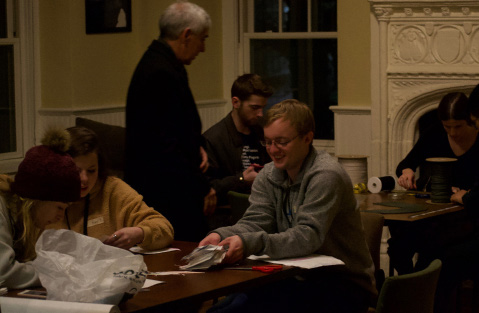Sociology Club hosts Moon Bee

Participants of the Moon Bee gather in Golub House. Photo by Alex Appel.
February 1, 2019
On Tuesday, January 22, the Sociology Club hosted the Moon Bee in Golub House. During this event, students as well as local residents were instructed by representatives from the MoonCatcher Project on putting together menstrual, or moon, kits for women and girls in developing countries.
“I feel like it’s my job to make it easier for people who have to go through what I have to go through,” Annika Eberle ’20 said in reference to experiencing shortages of menstrual supplies at points in her life.
The MoonCatcher Project makes reusable, washable menstrual kits for girls in 16 developing countries.
According to Founder and Director of the MoonCatcher Project, Ellie von Wellsheim, a lack of affordable menstrual products can stop girls from going to school for their whole period and hindered their education severely, to the point where they have to drop out of school altogether.
“It was ten years ago,” said von Wellsheim. “During a meeting in Saratoga Spring… that someone bought up this issue of girls in Zimbabwe not being able to go to school whenever they go through their menstrual cycle… because disposable menstrual products are too expensive for them.”
During their menstrual cycle, girls also cannot help with household chores or work that adds to the family income. “In a lot of cases, [the girls’] parents will betroth them, often to older men, for dowry money… the girls will have to [bear and] take care of kids when they themselves are still kids,” von Wellsheim explained.
This is a problem that extends beyond Zimbabwe and effects girls around the world. Ellie von Wellsheim spoke about how in menstrual huts in regions of Nepal. “Whenever [girls] go through their period, they have to stay in these stone huts away from the house… it was cold and windy. They couldn’t even stand up in those huts. And the worst thing is that men know that they are there unprotected and they can come and rape the girls.” Despite being criminalized in August 2018, menstrual huts continue to exist in certain regions of the country.
After this meeting, Ellie von Wellsheim, who already had a sewing business, set out to design a menstrual pad that is reusable, easy to use, resource efficient, adaptable to varying body types as well as being cheap to produce. She and her daughter who was in college at the time experimented with various prototypes.
“We took our mother-daughter relationship to a whole new level,” she laughed before explaining how they came up with a completed design, called “the carrier.” Ellie von Wellsheim also added that the MoonCatcher Project is cooperating with women in developing countries in manufacturing these kits as a way to provide income for these women as well as supporting the local economy.
In addition to providing menstrual kits, the MoonCatcher Project aims to inform and to destigmatize menstruation in developing countries. The project conduct classes on menstrual management and reproductive health in the countries they operate in. In doing so, not only are they giving girls an understanding of what is happening in their body, but the project is also trying to change the perception of those societies that menstruation is somehow taboo or impure.
“One of the ways through which we can change the world for the better is through education…that’s what this project is trying to do, helping those girls stay in school…it changes the whole cycle,” Schenectady resident Lawrence “Lon” Penna said.
According to Ellie von Wellsheim, Moon Bee events themselves raise awareness among Americans about the problems of the stigmas surrounding menstruation as well as sexual health in general. When asked about the participants in this event, she said, “Ideally, we would want a men to women ratio of about 50/50, but I’m glad that so many people turned up altogether.”






